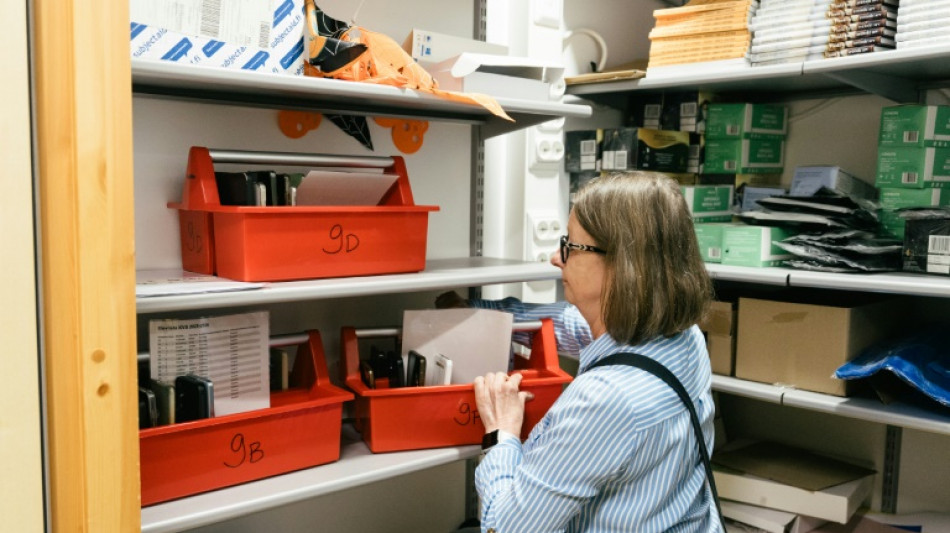
-
 Munsey leads Scotland to 207-4 against Italy at T20 World Cup
Munsey leads Scotland to 207-4 against Italy at T20 World Cup
-
Venezuela's Machado says ally 'kidnapped' after his release

-
 Japan restarts world's biggest nuclear plant again
Japan restarts world's biggest nuclear plant again
-
Bangladesh poll rivals rally on final day of campaign

-
 Third impeachment case filed against Philippine VP Duterte
Third impeachment case filed against Philippine VP Duterte
-
Wallaby winger Nawaqanitawase heads to Japan

-
 Thailand's Anutin rides wave of nationalism to election victory
Thailand's Anutin rides wave of nationalism to election victory
-
Venezuela's Machado says ally kidnapped by armed men after his release

-
 Maye longs for do-over as record Super Bowl bid ends in misery
Maye longs for do-over as record Super Bowl bid ends in misery
-
Seahawks' Walker rushes to Super Bowl MVP honors

-
 Darnold basks in 'special journey' to Super Bowl glory
Darnold basks in 'special journey' to Super Bowl glory
-
Japan's Takaichi may struggle to soothe voters and markets

-
 Bad Bunny celebrates Puerto Rico at Super Bowl, angering Trump
Bad Bunny celebrates Puerto Rico at Super Bowl, angering Trump
-
Seahawks soar to Super Bowl win over Patriots

-
 'Want to go home': Indonesian crew abandoned off Africa demand wages
'Want to go home': Indonesian crew abandoned off Africa demand wages
-
Asian stocks track Wall St rally as Tokyo hits record on Takaichi win

-
 Hong Kong sentences pro-democracy mogul Jimmy Lai to 20 years in jail
Hong Kong sentences pro-democracy mogul Jimmy Lai to 20 years in jail
-
Bad Bunny celebrates Puerto Rico in joyous Super Bowl halftime show

-
 Three prominent opposition figures released in Venezuela
Three prominent opposition figures released in Venezuela
-
Japan PM Takaichi basks in historic election triumph

-
 Israeli president says 'we shall overcome this evil' at Bondi Beach
Israeli president says 'we shall overcome this evil' at Bondi Beach
-
'Flood' of disinformation ahead of Bangladesh election

-
 Arguments to begin in key US social media addiction trial
Arguments to begin in key US social media addiction trial
-
Gotterup tops Matsuyama in playoff to win Phoenix Open

-
 New Zealand's Christchurch mosque killer appeals conviction
New Zealand's Christchurch mosque killer appeals conviction
-
Leonard's 41 leads Clippers over T-Wolves, Knicks cruise

-
 Patriots-Seahawks Super Bowl approaches as politics swirl
Patriots-Seahawks Super Bowl approaches as politics swirl
-
Trump says China's Xi to visit US 'toward the end of the year'

-
 Real Madrid edge Valencia to stay on Barca's tail, Atletico slump
Real Madrid edge Valencia to stay on Barca's tail, Atletico slump
-
Malinin keeps USA golden in Olympic figure skating team event

-
 Lebanon building collapse toll rises to 9: civil defence
Lebanon building collapse toll rises to 9: civil defence
-
Real Madrid keep pressure on Barca with tight win at Valencia

-
 Dimarco helps Inter to eight-point lead in Serie A, Juve stumble
Dimarco helps Inter to eight-point lead in Serie A, Juve stumble
-
PSG trounce Marseille to move back top of Ligue 1

-
 Two prominent opposition figures released in Venezuela
Two prominent opposition figures released in Venezuela
-
Hong Kong to sentence media mogul Jimmy Lai in national security trial

-
 Lillard will try to match record with third NBA 3-Point title
Lillard will try to match record with third NBA 3-Point title
-
Vonn breaks leg as crashes out in brutal end to Olympic dream

-
 Malinin enters the fray as Japan lead USA in Olympics team skating
Malinin enters the fray as Japan lead USA in Olympics team skating
-
Thailand's Anutin readies for coalition talks after election win

-
 Fans arrive for Patriots-Seahawks Super Bowl as politics swirl
Fans arrive for Patriots-Seahawks Super Bowl as politics swirl
-
'Send Help' repeats as N.America box office champ

-
 Japan close gap on USA in Winter Olympics team skating event
Japan close gap on USA in Winter Olympics team skating event
-
Liverpool improvement not reflected in results, says Slot

-
 Japan PM Takaichi basks in election triumph
Japan PM Takaichi basks in election triumph
-
Machado's close ally released in Venezuela

-
 Dimarco helps Inter to eight-point lead in Serie A
Dimarco helps Inter to eight-point lead in Serie A
-
Man City 'needed' to beat Liverpool to keep title race alive: Silva

-
 Czech snowboarder Maderova lands shock Olympic parallel giant slalom win
Czech snowboarder Maderova lands shock Olympic parallel giant slalom win
-
Man City fight back to end Anfield hoodoo and reel in Arsenal


Finnish phone ban brings focus, and chatter, back to school
Students huddle together in the corridor, chatter filling the air on a break between classes at a school in Finland, where mobile phones have been banned since school resumed in August.
At Kungsvagens Skola for students aged 13 to 15 in Sipoo, northeast of Helsinki, teachers collect students' phones in the morning and lock them in a storage room until the end of the school day.
Principal Maria Tallberg said the transition to a phone-free school had "exceeded expectations".
"Of course, they (students) grumbled a bit in the beginning, especially since they can't use them during breaks, but they also understand why, deep down," Tallberg told AFP during a recent visit.
"Many have also said they were not aware they were so addicted to their phones."
The new law banning phones during class-time came into force on August 1 across Finland, a country long known for its high-quality education.
Several municipalities and individual schools have now chosen to extend the ban to breaks as well.
Previously, the Finnish National Agency for Education had recommended that schools restrict the use of mobile phones in classrooms.
The ban comes amidst a global debate on how smartphone use affects not only mental and overall health, but also learning and education.
Reports, including one from UNESCO in 2023, have warned that phones in the classroom can hamper learning by causing distraction.
Several countries have adopted similar restrictions, including South Korea, Italy, the Netherlands and France.
- 'Very different' -
Annika Railila, a chemistry teacher at Kungsvagens Skola, said classrooms were now calmer and students less distracted.
"Before, we had to remind them almost every lesson that the phone stays in their bag and you don't use it during the lessons."
Students also socialise more during breaks now, she said.
"You actually get to see their eyes and faces, which is a lot nicer than to say hello to someone who's looking at the screen," she added.
15-year-old Kie Lindfors described the school environment as "very different".
"I talk more with people and there is a room in the school where there are board games and stuff so that's been lots of fun on recess, going there to play," he said.
His classmate Lotta Knapas felt the school had become "a lot more noisy" and "wild".
"I understand that we can't use them in lessons but I think it is kind of dumb they take them away from us for the whole day," she said.
Meanwhile, Oscar Ingman, 14, feared some students might feel more lonely.
"I see more people being more sociable, more people talking and so on. But I also do see occasionally some people just sitting alone in a corridor," he said.
The school aimed to organise activities to prevent kids from having nothing to do, the principal said, noting that internet bullying at the school had already decreased.
"Students used to take pictures and film both during lessons and a lot on breaks, and we often had to investigate when video clips were shared everywhere," said Tallberg.
- Reverse the trend -
Finland's new law was adopted after education scores plunged, Finnish Education Minister Anders Adlercreutz told AFP.
"We have noticed in Finland, as in many other countries, that our reading and mathematic skills have deteriorated and the Finnish approach is to think about how we can create more space for learning and teaching," Adlercreutz said.
"Removing disturbing elements from the classroom helps."
The latest results from the OECD's Programme for International Student Assessment (PISA) from 2022 showed Finnish 15-year-olds' skills in mathematics, reading comprehension, and science had declined.
Finland nonetheless still ranked above the OECD average for all subjects among the 38 member countries.
The phone ban did not mean schools were exiting the digital world, Adlercreutz insisted.
"It is important for children to have physical books, but they also need to be digitally literate," he said.
"But in a world that is moving so fast, perhaps the role of schools is also to teach slowness, to be a place where you have to force yourself to read longer texts, focus on one thing, and work purposefully toward a long-term goal."
L.AbuAli--SF-PST




